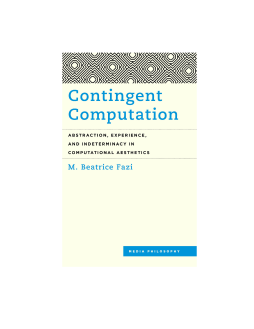
Additional Information
Book Details
Abstract
In Contingent Computation, M. Beatrice Fazi offers a new theoretical perspective through which we can engage philosophically with computing. The book proves that aesthetics is a viable mode of investigating contemporary computational systems. It does so by advancing an original conception of computational aesthetics that does not just concern art made by or with computers, but rather the modes of being and becoming of computational processes. Contingent Computation mobilises the philosophies of Gilles Deleuze and Alfred North Whitehead in order to address aesthetics as an ontological study of the generative potential of reality. Through a novel philosophical reading of Gödel’s incompleteness theorems and of Turing’s notion of incomputability, Fazi finds this potential at the formal heart of computational systems, and argues that computation is a process of determining indeterminacy. This indeterminacy, which is central to computational systems, does not contradict their functionality. Instead, it drives their very operation, albeit in a manner that might not always fit with the instrumental, representational and cognitivist purposes that we have assigned to computing.
This remarkable book proposes a radically new vision of computation: one that will equally surprise the rationalists and cognitivists, on the one hand, and the vitalists and affectivists, on the other. M. Beatrice Fazi shows how Turing-style computing -- logical, discrete, and pre-programmed as it is -- also necessarily involves indeterminacy, novelty, and invention.
Steven Shaviro, Wayne State University
Contingent Computation by M. Beatrice Fazi is a brilliantly original work arguing that the contingent does not lie outside computation but at its very heart, in the demonstrations by Gödel and Turing that some problems are incomputable and that formal systems, including computational axiomatics, are incomplete. Her approach opens our understanding of what computers can—and cannot—do to new modes of analysis that introduce contingency into technical systems in an entirely new way, refuting views that see computers as merely mechanical systems incapable of novelty. Highly recommended for humanities scholars and others interested in thinking about the role that computers play in a world that remains unknowable in its full complexity.
N. Katherine Hayles, James B. Duke Professor of Literature, Duke University
From aesthetics to abstraction and onwards to experience, M. Beatrice Fazi argues against the usual clichés about computation. Contingent Computation shows that media theorists and machines should be valued based at least on one thing in common: they don’t do just what you expect them to. Fazi’s take on computational indeterminacy is rigorous, rich and rewarding.
Jussi Parikka, Professor in Technological Culture and Aesthetics, University of Southampton
Digital computation originated from formalizing the limits rather than the data processing power of computation. In the true spirit of the Media Philosophy book series, Fazi takes this as a chance to rethink the computer in favor of the unpredictable. While her argumentation, through the lenses of Whiteheadean terms, insists on the author's "me" against the computational "it", it will be emerging non-classical computers themselves which will truly appreciate the message of this book.
Wolfgang Ernst, Professor of Media Theories, Humboldt University of Berlin, Germany
M. Beatrice Fazi is Research Fellow at the Sussex Humanities Lab (University of Sussex, United Kingdom). Her primary areas of expertise are the philosophy of computation, the philosophy of technology and the emerging field of media philosophy.
Contingent Computation provides many of the keys to understanding how computing now becomes the reality-forming device par excellence. At the same time, this daring and rigorous book offers new tools for aesthetics.
Matthew Fuller, Professor of Cultural Studies, Goldsmiths, University of London
Table of Contents
| Section Title | Page | Action | Price |
|---|---|---|---|
| Contents | v | ||
| Acknowledgements | vii | ||
| Introduction | 1 | ||
| Part 1: Aesthetics | 21 | ||
| 1 Continuity versus Discreteness | 23 | ||
| 2 Computation | 47 | ||
| 3 Processes | 61 | ||
| Part 2: Abstraction | 81 | ||
| 4 Computational Idealism | 83 | ||
| 5 Axiomatics | 97 | ||
| 6 Limits and Potential | 113 | ||
| Part 3: Experience | 141 | ||
| 7 Computational Empiricism | 143 | ||
| 8 Factuality | 157 | ||
| 9 Actuality | 173 | ||
| Conclusion | 203 | ||
| Bibliography | 213 | ||
| Index | 223 | ||
| About the Author | 239 |
